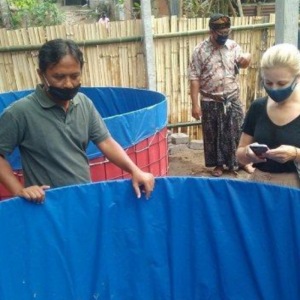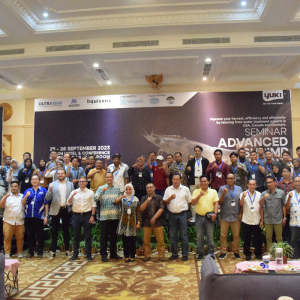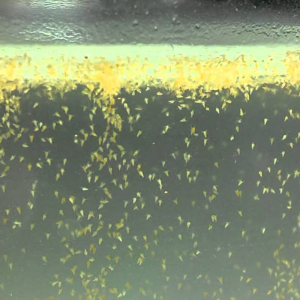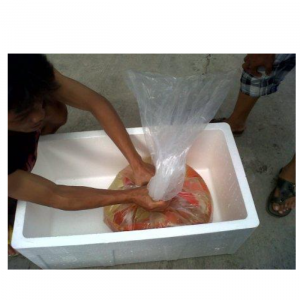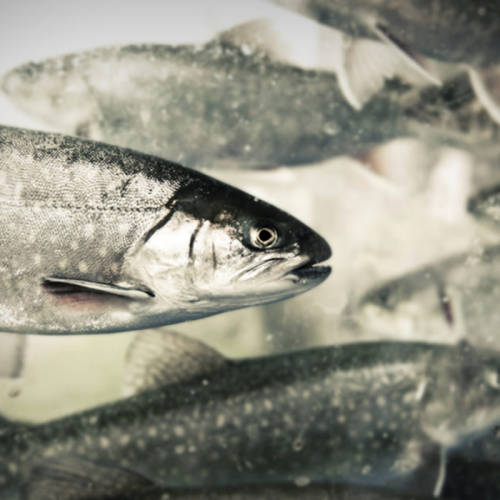
Third F3 Challenge Centers on Carnivores
| Thu, 05 Sep 2019 - 14:21
The third F3 (fish free feed) Challenge launches today with an eye on carnivorous species, which have long faced scrutiny for their dependence on fishmeal and fish oil from wild-capture fisheries.
F3 Challenge judge Michael Tlusty, associate professor of sustainability and food solutions at the University of Massachusetts Boston School for the Environment, told The Advocate that this new alternative feed ingredient challenge will address feeds for two dominant farmed species consumed in North America: salmon and shrimp, products with huge influence on international seafood trade.
“They do really well on fishmeal,” Tlusty said of farmed salmon and shrimp. “The micronutrients, the proteins, the types of fats – these are what fish feed on. That’s why fishmeal and fish oil have been such valuable resources. Switching to a feed that does not contain marine ingredients, the challenge is making sure you get the right nutrient balance.” F3 Challenge-Carnivore Edition launches today and is open to any company that is the owner or licensee of a fish-free feed for a carnivorous fish in the salmon, shrimp and “other” categories (trout, halibut, sturgeon, sea bass, kampachi, etc.). As with previous F3 contests, the winner will be the company to sell the most fish-free feeds over a roughly two-year period. The inaugural challenge, which came with a $201,000 prize, was won by Guangdong Evergreen Feed Industry Co., Ltd.
The second F3 Challenge, which is currently ongoing, was designed for fish oil replacements. F3 announced in August that three companies – Mowi, the world’s largest Atlantic salmon producer, China-based Yuehai Feed Group, and AlphaFeed – will trial the winning oil, with the results fed into F3’s Feed Innovation Network (FIN) online database. Veramaris – a joint venture between Royal DSM and Evonik – was the leader in sales with its algae-based oil, according to the latest update provided by F3 in August. It opened its algae-based omega-3 oil production facility in Nebraska this summer. The winner of the oils challenge will be announced at the Global Aquaculture Alliance’s GOAL conference in Chennai, India, in October.
To push the aquaculture industry to step up, we are focusing on carnivores, where the greatest level of substitution is going to have to take place.
Kevin Fitzsimmons, professor at the University of Arizona and another F3 judge, said the degree of difficulty increases with every F3 contest, because it’s a reflection on the speed that innovations are coming out of research into commercial applications. “The biggest challenge for the innovators and feed companies to create F3 feeds for salmon will be the nutrient balance and any unforeseen side-effects. The protein and omega-3 ingredients surging into the markets seem to be meeting the nutrient requirements just fine,” he said. “But in that they are not exactly the same as fishmeal and fish oil, we are aware that there could be imbalances in micro-nutrients or an unexpected anti-nutritional factor.”
The carnivore challenge feed-sales period begins Oct. 1. Tlusty said the biggest issue facing carnivore feed manufacturers is scale, and most of the hopeful alternatives like algae, single-cell proteins and insect meal all face the same concern. “These alternative ingredients aren’t being produced in sufficient enough biomass,” he said. “To push the aquaculture industry to step up, we are focusing on carnivores, where the greatest level of substitution is going to have to take place.” A key aim of the F3 Challenge is simply to “create a social stir around the availability and potential” for alternatives, and to get the marketplace calling for it, said Tlusty, pointing to a recent announcement by England-based retailer Tesco as a milestone. Tesco said it was encouraging its farmed salmon suppliers to adopt feeds containing algal oils rich with omega-3 fatty acids and was updating its procurement standards. Tesco said Atlantic salmon (Salmo salar) is its most popular species of farmed fish, and that one of its suppliers in Norway was already providing fish raised on feeds with algal oil.
Tlusty expects big aquafeed players like Skretting, Cargill and BioMar to participate in this challenge, either as a contestant or discussion participant, and that there will be a variety of solutions deployed, including terrestrial livestock byproducts like poultry feather meal, the aforementioned algae and genetically modified (GM) crops like soy and camelina – even a GM yeast product, which Chile-based salmon producer Verlasso used in its feeds before changing its formulation a few years ago, could be in play.
“As so many GM products are used in animal feeds globally and the scientific consensus is that the few side effects are grossly outweighed by their benefits, we elected to allow their use in the challenges,” said Fitzsimmons. “The role of GM and other biotechnologies in revolutionizing all kinds of animal feeds and other aspects of agriculture is undeniable. Our observations have been that even the most mundane aspects of farming are influenced by an array of biotechnology on a daily basis. The mass culture of beneficial bacteria, algae and yeasts and enzymatic treatment of ingredients are key technologies that are driving sustainable aquafeeds.”
F3 isn’t really about innovation, Tlusty said. Instead, it’s about “highlighting innovation at scale” because for F3 feeds to gain traction there can’t be questions about supply. “We are looking for volume. You have to get out to market, and everything has to align and have an impact” with producers, buyers and consumers, said Tlusty. “We’re trying to get this alignment. [F3] draws attention to it, and acts as a focal point, helping the aquaculture industry shift to a better place.”
“We also want to publicize the significant numbers of forages fishes that will be left in the ocean as alternative ingredients are used instead,” added Fitzsimmons. Winners of the three categories in the Carnivore Edition challenge will win $35,000 plus any additional amounts from contest sponsors through fundraising or crowdfunding on the F3 Challenge website. Current sponsors include the Anthropocene Institute, The Nature Conservancy and Synbiobeta, among others. Winners will be announced at an industry event in the fall of 2021.
Source : www.aquaculturealliance.org













